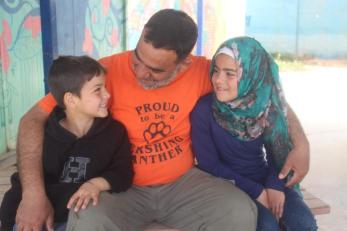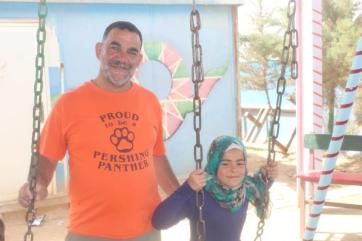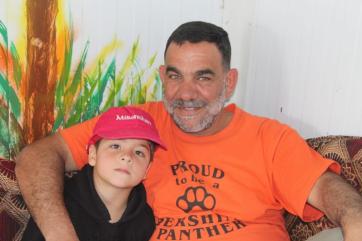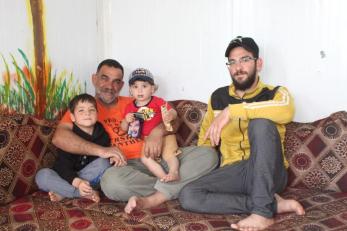Adham Al Hariri – a role model to Syrian fathers in Za’atari for good parenting

The Za’atari camp currently hosts about 88,254 refugees, significantly more than its official capacity of 60,000. Living in prefabricated structures—which are sometimes extended by tents—is the common form of living for Syrian refugees residing in the Za’atari refugee camp. People inside camps by and large have less space. In Za’atari, 57% of households have one housing unit (caravan); 34% report two units, and only 8% have three units or more. Cramped living conditions inside the camps place significant pressure on parents to accommodate for a good quality of life for their children.
Adham Al Hariri, a Mercy Corps participant in the parenting program under ISHRAK mentions how hard it is for him to provide an independent space for his adolescent sons and daughters who seek privacy and independence which is a basic adolescent need.
After ten years, access to decent, well-paid employment that gives a feeling of job security is still a distant hope for most. The economic conditions increase parents' pressure even further to provide a quality life for their children. According to a recent World Bank report, all camp refugees receive 23 Jordanian dinars, or about US$ 32 per person per month through the World Food Program's (WFP) blockchain system to cover food needs. Furthermore, the majority (78%) of job-seeking Syrian male refugees who are in the labor force and aged 15 and above are men.
Adham Al Hariri mentions to Mercy Corps, “since 2013 I started selling off my property in Syria to provide a decent living for my family which consists of 11 members, as the only breadwinner of the family, I have depleted all my resources.”
In 2014, property income was reported by 5% of all households in the Za’atari camp, according to a recent study published by the Ministry of Planning and International Cooperation (MoPIC) “The living conditions of Syrian refugees in Jordan.” The same study indicates that debt is reported by 55% of the Za’atari camp population.
Adham continues, “to this date, I have spent all my savings from selling properties and I have debts for relatives in Syria.”
Moreover, adolescent children tend to compare how their parents respond to their new needs in the teens age, i.e. requesting more freedom and independency from parents’ rules, and other materialistic needs versus other Syrian parents in the camp. This can be stressful for parents when they are striving to maintain their children’s good behaviors and obedience to their upbringing. The situation is harder for female adolescents as parents are more rigid and conservative around their freedom of choice and movement outside the house.
The aforementioned stressors faced by Syrian refugee parents in camps increase their tendency to opt for violence when dealing with their young and adolescent children and hinder the possibility for maintaining a healthy relationship that is built on trust between them.
When Adham started attending the parenting program with Mercy Corps he started to observe his violent approaches with his adolescent children in light of the new knowledge he received on positive parenting and developmental needs, and techniques on how to approach adolescents, and that his upbringing style is causing them stress.


Through the shared examples from the Mercy Corps course trainer, he learned new ways in finding solutions with his adolescent sons, in particular, to obey him without depending on fierce actions and words, instead, he seeks to conversation and persuasion approaches with his sons and started to build a mutual trust ground in dealing with them, such as not to question all their actions and their whereabouts and get to know the information he needs indirectly.
Through the parenting program, Adham realized the urgent need to understand and respond to the basic needs of his adolescent daughters too, he learned to appreciate their self-esteem, their need for self-actualization, and how to meet their basic needs as this is key to their growth and success in the future.
Like many other fathers participating in this program under ISHRAK, Adham has gained new insights and skills that promote healthy and effective parenting practices with his children of all ages. He mentions an incident with his 6-year-old son who refused to go to school one day, he made his little boy indirectly listen to a side-conversation with his mom, saying: “if Ahmad doesn’t go to school today don’t give him his pocket money.” Ahmad swiftly put on his bag and went to school eagerly, Adham mentions, “instead of forcing him to go unhappy to school, my little boy went to school by his own free will, feeling content and not punished.”
Through his journey in the parenting program, Adham sensed that being the father of the family, he should not negatively affect the healthy atmosphere among family members at home by bringing in his stress and anger from outside difficult circumstances. Instead, when he is feeling stressed, he speaks to trustworthy friends about his problems and finds ways to calm himself before coming back home.

Moreover, Adham became a role model to other Syrian fathers in his community who come to speak to him about the problems they face in raising their children and wanting them to obey them without opting for violent behaviors. Adham provides them with advice on parenting practices and approaches he learned and encourages them to enroll in the program.
Through the parenting program under ISHRAK, Mercy Corps will continue to improve family and children relationships by equipping parents and caregivers with constructive knowledge and skills that promote healthy and effective parenting practices. The program is constantly adapted to the needs of the community and tackles difficult themes, including toxic stress during the pandemic, positive parenting and developmental needs, and techniques on how to approach adolescents.